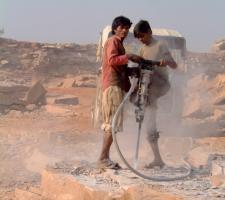
Demand for decorative paving in Europe means significant quantities are now sourced from India but production is not always managed ethically. Lisa Russell reports on how Marshalls has taken a stance to bring about change
If a product's outstandingly cheap price looks too good to be true then there is probably a catch. And if that ultra-cheap product is paving made from Indian sandstone then the catch is likely to be that it has been sourced with scant regard to ethics or the environment. Many of the thousands of quarries in Rajasthan employ children as young as six, enforce bonded labour and ignore safety.
However, UK-based building products company
Achieving all this doesn't add a great deal to the cost of the finished product, according to Marshalls group marketing director Chris Harrop. "By the time it's landed in the UK it is probably about 20% more expensive - but the benefits in India are huge," he said. Besides, materials usually account for only a small proportion of the finished project costs. "We haven't seen our business suffer at all by charging what on the face of it seems a premium for the same geological product - in fact the opposite." In the last seven or eight years there has been a massive explosion in the amount of building materials imported into Europe. This has enabled capacity issues to be solved, has opened up new types of materials and has helped with cost inflation. "But with all that come some very big questions about where it has come from and how it has been sourced and manufactured," he said.
A report, The small hands of slavery published last year by Save the Children, said that children make up 20% of the workforce in India's sandstone quarries. Harrop has seen for himself the shocking scenes of small boys and girls labouring in quarries, carrying heavy loads, wielding sledgehammers and operating jack-hammers without protective clothing.
Europe is the largest importer of Indian stone. Paving is the primary use in the UK, memorials account for many sales in some countries and stone setts are particularly popular in Germany, the Netherlands and Belgium. The volume of natural stone setts, kerbstones and flagstones imported from outside the EC has soared, from less than 1,000tonnes in 1996, to about 11,000tonnes in 1996 and more than 206,000tonnes by 2006.
A report commissioned by the India Committee of the Netherlands (ICN) alerted Harrop to the issues at the quarries. The report, Budhpura 'Ground Zero' - Sandstone quarrying in India focused on Budhpura village, which is in the part of Rajasthan that Marshalls sources products from. It identified widespread problems, including child labour, exploitation of workers, unsafe practices and environmental damage. One of the abuses that takes place is bonded labour, an outlawed system in which a person borrows to survive, then has to work to pay off the debts to the employer. These debts are often passed down to the children if their parents die.
The shocking information in the report led Marshalls to take action, starting by consolidating all supply into a single manufacturer. "We could then work with them on tackling these big ethical issues," explained Harrop.
The chosen supplier is Stoneshippers India, which has worked with Marshalls to achieve compliance with an internationally-recognised standard. Marshalls was the first hard landscaping company to join the Ethical Trading Initiative (ETI) and has adopted the ETI base code, whose provisions include that no-one should be forced to work, working conditions should be safe and healthy, child labour should not be used and that wages should be enough to live on and provide some discretionary income.
Harrop believes that it is vital that all imports from India comply with the code. "It means that the product has been produced well and responsibly," he said. Further guidance on good practice comes from a working group which ICN was instrumental in setting up. This brings together Dutch stakeholders in the sector and has developed a code of conduct, which Marshalls also fully supports and complies with.
"In our market, ethical trade is becoming very important to consumers," said Harrop. Environmental impact is also of increasing concern. The carbon footprint of the ethically-sourced natural sandstone is about twice that of a UK-produced concrete equivalent and Marshalls is transparent with the information. "Customers can then make an informed choice," he said.
It is important to achieve an equitable way of making a profit, while making a positive impact on the environment and communities in Rajasthan. "The pattern is that you start off by paying living wages and excluding children from working in the quarries," he explained. The two have to be targeted in tandem. One of the reasons why children work is because the family doesn't have enough income. A living wage there is currently about 200 rupees. "I've talked to workers in other quarries - not ones that we use - who are earning 50 rupees a day," he said.
If the family has a decent income, the children can go to school instead of working - but this means providing the facilities. A complication is that children are eligible for free education only in the state they were born in, but the workers tend to be migrants from elsewhere.
Marshalls has been funding Hadoti Hast Shilp Sansthan, an NGO which helps to transform the lives of migrant workers. Funding for social insurance and mobile medical facilities began last year. This year's money helps provide wider support as well as education.
There has been a 50% increase in the support this year and Harrop finds it satisfying to see the opportunities that are being created. "I went to a Saturday morning school - there were 47 children there who'd never before had any schooling," he said.
The company has also started to help workers in the area's many illegal quarries. Funding has enabled Hadoti to carry out projects including a social insurance programme, co-funded by the government. Stoneshippers workers already receive life and critical illness insurance, but the programme extends the benefits to others. Without such cover, even those who lose a limb in a quarry accident often have no choice but to return to labouring.
The measures that have been taken extend beyond welfare. For instance, the stone calibration factory has been equipped with a water processing and recycling system to keep waste out of the local water course. Marshalls is now turning its focus to the wider environment, working with a team from Bangor University's Centre for Arid Zone Studies to identify remediation opportunities.
"I'm conscious that Marshalls can't solve all the issues of India's sandstone industry," said Harrop. "What we are trying to do is make sure that we are doing everything we can within our supply chain and in the areas around our supply chain."
He continues to be shocked by what he sees as he drives through the region. "My plea is that the rest of the industry takes this seriously," he said. It is important to investigate the supply chain closely at first hand, and to take action. "It's sometimes too easy to say that customers aren't bothered - but it's only because they don't know. If they found out afterwards then the effect on your reputation and credibility would be very damaging.".

















